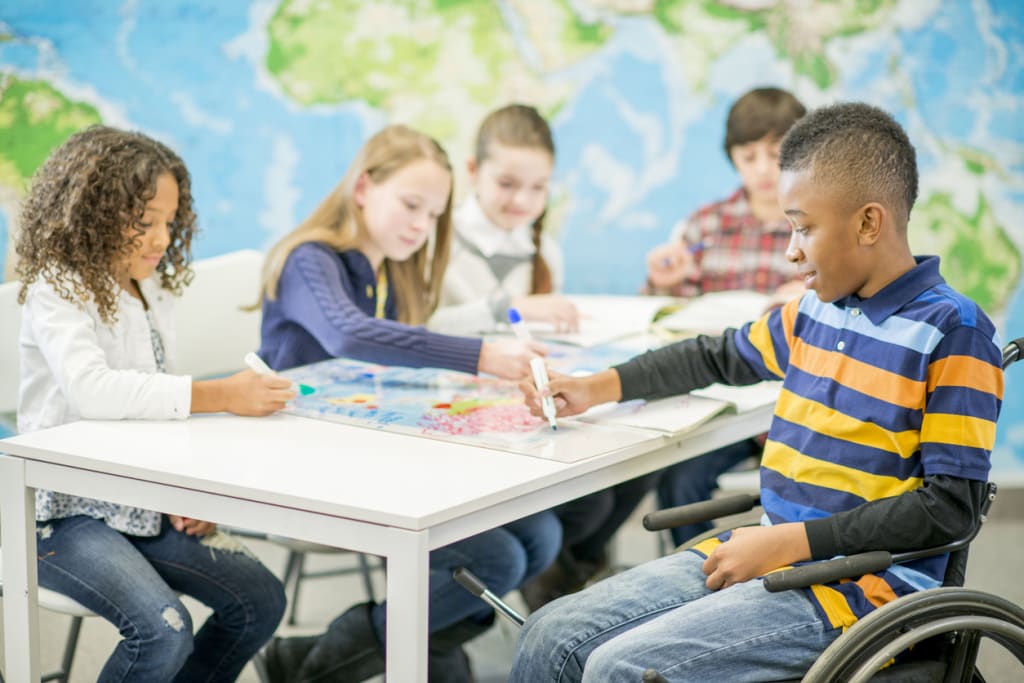Disability Education
Why Students Should Be Educated In Disabilities

Much advancement as been made in the area of equality. Women gained the right to vote, segregation laws against African Americans were removed, and the LGBTQ+ community has gained support and protections. However, one population still under-served is those with disabilities. From failure to provide adequate accessibility to special needs students being bullied at school, there is evidence of the lack of knowledge and understanding when it comes to disabilities.
My Experiences With Disabilities
In elementary school, I had two boys in my class with autism. One individual was simply "socially awkward" and unable to learn like the rest of us. The other was wheelchair-bound and only spoke a few words. I, a quiet outsider, naturally attempted to befriend both of them. Their special-education teacher started inviting me to help teach them and socialize with the rest of her students. This was my first experience with special needs students.
I switched schools in 5th grade. My new school did not have inclusive classrooms and I rarely saw any special-ed students. It was not until sophomore year of high school that I again connected with students with disabilities.
The first year it was established, I joined our school's Project UNIFY club. This is a group of special-ed students, "regular-ed" students, and teachers who work together in order to foster awareness and advocate for those with disabilities. Through fundraising, Special Olympics events, and socializing with each other, we learned not only more about the needs of students and community members but about each other.
I am also thankful that I, and one other regular-ed student, were asked to become the first leaders of our club and represent our school at a state Special Olympics Leadership Conference. There I learned more about the Special Olympics and adults with disabilities. All of my experiences with Project UNIFY taught me so much. Becoming a part of this community was one of the largest highlights of my high school career.
Looking forward, I am now a college student studying psychology. As a part of the Army ROTC program, I have committed to serving in the military. My plans are to help those who are suffering from Post-Traumatic Stress Disorder (PTSD) or other disorders by becoming a psychologist for veterans and current military members. This is a long way off of my dreams of becoming a band director like I thought I would do at the beginning of high school. All of my experiences with disabilities made me realize how much I love learning and helping the community.
Students Need Education
There are many disability avocation groups that aim to educate society on the needs of individuals with disabilities. However, these groups can only reach so many. Requiring education on disabilities in school would be an effective way to reach a whole generation.
If you read my previous article, "Why Children Need to Learn Basic Psychology", you may recall the importance of educating students on such a topic at a young age. Not only is childhood a prime time for learning, but it is when children develop their belief systems and social skills. Educating young children on disabilities is likely to make them more accepting adults. Fostering acceptance is an important step in recognizing those with disabilities.
Breaking the Stigma
Many individuals have never had close experiences with someone with a disability. A lack of experience often leads to misunderstandings or the start of stereotypes. Exposure to other people allows us to break through those barriers. This is seen between cultures, social classes, and so much more.
Each disability is different and each individual is their own being. Recognizing this is the first step to tearing down stereotypes and understanding what constitutes as appropriate accommodations. Many disabilities are on a spectrum. This means that while some individuals may only see their disability as an annoyance, it can be completely debilitating for others. Other factors may also play into the severity of someone's disability, such as stress, financial burden, available accommodations, or other health issues. It is also important to note that people can have mental disabilities, physical disabilities, or both. Not every disability can be seen and just because someone has a physical disability does not mean they are mentally impaired.
Education is likely to reduce the risk of bullying and discrimination. A person is less likely to act hostile toward someone they can empathize with. In the workforce, discrimination can happen with malicious intent or be a product of innocent ignorance. The Disability Rights Act prevents discrimination on the basis of a disability. However, the boundary is not always clear. An employer may argue that the individual requires too many accommodations, makes other employees uncomfortable, or lacks the ability to complete the job. Often times, there is an assumption in this matter. Perhaps accommodations are actually minimal or maybe the applicant has the ability to fulfill their work in unconventional ways. In any case, everyone deserves a chance to prove their abilities and should not be denied that simply because others are ill informed.
The social issues surrounding disabilities often go unnoticed due to a lack of education. Simply educating students on disabilities will likely foster acceptance and raise awareness. It is time to dispel rumors and tear down stereotypes. Disability issues are not taboo - they are someone's life.
About the Creator
Lorraine Woiak
I am a psychology and music major at the University of North Dakota. As a part of the Army ROTC program, I am working towards a career as a military psychologist.





Comments
There are no comments for this story
Be the first to respond and start the conversation.